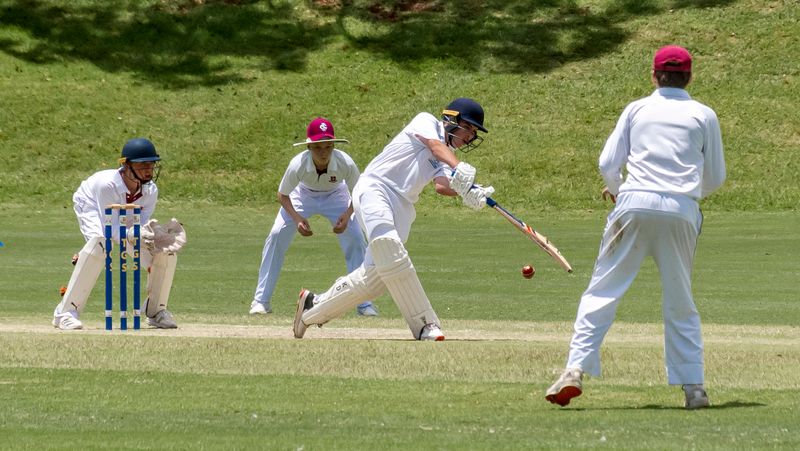“Many of the respondents spoke of controlling the controllables across six broad themes: Consistency and Routine, Using Study Tools, Environment Control, Intrinsic Motivation, Resilience and Perspective.”Mrs Crystal Hede, Director of Learning and Innovation

Giving students the opportunity to cope with disappointment has the capacity to shape their good character.
Schools are inherently hopeful and happy places. Their natural focus on growth, connectedness and preparing youth for a better future creates an optimistic atmosphere in which ambitions are born. These positive emotions and experiences lay the foundation for our expectations and while these can be highly motivating, they come with a catch: the greater our expectations, the greater the disappointments, too.
Disappointment is not a popular feeling. Rightly so, not many of us wish to feel sad, displeased or frustrated by the non-fulfilment of our hopes or expectations. However, in an academic setting, disappointments are inevitable and they can manifest in various forms. Commonly, students can find it hard to understand a concept that they see their peers comprehending and receive a lower-than-desired assessment result. Even worse, they can feel “robbed” of a grade that they believed to be rightfully theirs, not be with their preferred teacher, fall short of the required points for an academic award and face unexpected obstacles that disrupt their learning. Invariably, students will experience one or more of these things at some point in their schooling, possibly all of them, often.

For parents, it can be incredibly difficult to watch our children experience these things, especially when they result in further negative emotions such as shame or self-loathing. Sometimes, the worry we feel for our children is almost unbearable and it is natural to want to fix the problem for them. Prominent clinical psychologist, Dr Judith Locke is a leading voice on this topic. In her article, Kids need to fail. And parents need to let them; she says, “When your child is disappointed, it’s understandable you want them to feel better immediately, but taking temporary bad feelings away makes your child less capable to face inevitable trickiness in the future.” Locke goes on to say, “While I know it feels awful to watch your child be disappointed or sad, every time you help them avoid those feelings, you also sidestep them learning essential skills of resilience and a belief they will cope if life doesn’t always go their way.”

For these reasons, we will not shield students from experiencing disappointment at TGS. Doing so would be detrimental to their development and this fails to prepare them for the realities of life. Most importantly, giving students the opportunity to cope with disappointment has the capacity to shape their good character. As beautifully put by Irish politician Sir Boyle Roche, “Disappointment is the nurse of wisdom.”
I sought the wisdom of some of our older TGS students who have learned to manage their disappointments over time and even harness them for good. Specifically, I surveyed recipients of diligence awards because these recognise dedication and resilience rather than grades. All the respondents admitted to encountering setbacks and shared various versions of not letting these deter their efforts. One of the seniors said, “When faced with disappointment, I use ‘failure’ as a motivator to strive for improvement and apply the feedback I receive to make adjustments for the future.”
- Consistency and Routine: Diligent students emphasised the importance of sticking to a structured study schedule. They often study at the same time every day and for consistent durations to build a habit of regular learning.
- Using Study Tools: Many of these students use study trackers, whiteboards and diaries to reinforce learning and ensure they systematically cover all necessary material.
- Environment Control: They create and maintain separate spaces for study and relaxation to condition their minds for productive work when in the study zone. This includes removing any electronic devices from the study area.
- Intrinsic Motivation: Consistently, the diligent students spoke of a strong internal drive to improve and put in the effort required to overcome academic hurdles. This includes proactively seeking clarification or help.
- Resilience: Their responses demonstrated resilience in the form of a “bounce back” mentality. They spoke of accepting that not all decisions will be to their liking (for example, class allocations), acknowledging their negative emotions and then moving on in order to stay focused on their learning.
- Perspective: Maturely, some of the boys spoke about managing their expectations. While hopes and dreams can be powerful motivators, it’s important to balance them with realistic expectations to maintain a healthy mindset.
TGS Old Boy (2011-13) and 2024 Paris Olympic medalist, Matthew Denny recently spoke with our students, sharing some anecdotes and advice that aligned with the above sentiments. He said that one of the biggest things he learned from his career was that “Success lies on the other side of discomfort. You just need to step toward it and keep moving.” Matthew’s wise words support the notion that disappointment — a form of discomfort — is a natural and expected part of life that forms our character as we strive towards our goals and aspirations. With this in mind, our TGS boys need to keep dreaming but expect that disappointment will occur. They need to keep moving and trying and see disappointment as an opportunity for learning.
Reference
Locke, J. (2019, March). Kids need to fail. And parents need to let them. The Courier Mail. Retrieved September, 2024, from https://www.couriermail.com.au/rendezview/kids-need-to-fail-and-parents-need-to-let-them/news-story/5df007cfd72f50b4a22b03c39c127781
Latest Blog
Helping Boys Build Stronger Identities at TGS
Social media influencers, hyper‑masculine stereotypes and the pressure to “perform” academically, socially and emotionally can distort a young man’s sense of self long before he has the tools to understand what he’s feeling. Toowoomba Grammar School (TGS) has recognised this challenge and responded with intention. Through a bespoke Pastoral Care model and a powerful partnership with Tomorrow Man and other leading professionals, the School is reshaping how boys understand identity, connection…
Cambodia Cultural and Service Tour
Across twelve days with RAW Impact, the group moved through moments of cultural immersion, physical work, reflection and genuine connection with local communities. Their words capture the impact more powerfully than any adult could. Phnom Penh: Confronting history to understand the present The tour began in Phnom Penh, where the group visited the Killing Fields and S21 before beginning their service work. For many boys, this was the moment they realised the tour would be life changing. As Year…
Old Boy Geoffrey Smith inspires at our Senior School Speech Night
Toowoomba Grammar School’s Senior School Speech Night was marked by a powerful address from Old Boy Geoffrey Smith (2002–06), recently named the 2025 Australian of the Year for Queensland. Geoffrey, co-founder of Australian Spatial Analytics (ASA), has become a national leader in recognising the untapped potential of neurodivergent Australians in the workforce. His organisation provides geo-spatial and engineering services while creating meaningful employment opportunities - with 80 per cent…
Tears at the Gate, Pride at the Finish
Melanie Elms says she regularly sees a group of TGS parents socially, they've become lifelong friends Heartfelt moments bookend the boarding years “It feels very surreal. I'm proud, but it is very surreal.” Those were the words of Mrs Melanie Elms from 'Taringa' near Edgeroi, New South Wales, as she reflected on the moment her youngest son Sam finished his time at Toowoomba Grammar School. An end to walking up to Taylor House returning a boarder to TGS forever and it comes just 12 months after…
The Grammar Boy: TGS Character Cast in Bronze for All Time
Unveiled on Friday, 7 November 2025, this new statue is more than a work of art. It is a symbol of the enduring character that has shaped Toowoomba Grammar School for 150 years. The ceremony began with the ringing of the School House bell, it’s a sound many current students were hearing for the first time but one that may just have stirred memories for some of the Old Boys in attendance. As Headmaster Dr John Kinniburgh remarked in his address, “Today is a special occasion… one I’ve been…
Taking TGS Rugby West: making mates in the Longreach district
Last month, Head of Rugby Lincoln Clapham, TGS Old Boys' Association Vice President, Trent Raymond (1989-93) and two Year 11 boarding students, Luke Burrow (2025 First XV Co-captain) and Archie Smart, travelled 11.5 hours west to Longreach to deliver rugby clinics in partnership with the Longreach School of Distance Education (LSODE) and Western Queensland Rugby Union. Archie and Luke had both been to Longreach before but enjoyed the QANTAS Founders Museum The visit was part of a broader…
The Modified Rugby Program’s Game-Changing Impact
Founded in Brisbane in 2014 by the not-for-profit GingerCloud Foundation Limited, the Modified Rugby Program (MRP) gives neurodiverse young people the chance to play a sport and their families the opportunity to be part of a sporting community. It also allows coaches and player mentors the very privileged role of helping these young people have what many consider a normal experience - the joy of being part of a team. For Year 12 boarder Will Brown, it is a cause that is close to his heart.…
When School days become years of Mateship, Growth and Unforgettable Memories
Yesterday’s Awards Assembly for our senior cohort saw lashings of pride, reflection and a time for parents and caregivers to savour the very nearness of graduation after years of growth and grit. As the boys prepare for their final external exams and the much-anticipated Formal, this gathering marked the beginning of their final chapter at Toowoomba Grammar School. The assembly featured a moving reel that traced their growth from wide-eyed Junior School boys to confident young men. There were…
Japan: A Journey of Discovery, Culture and Connection
For 30 students and four staff members from Toowoomba Grammar School, the recent Japan Cultural and Technology Tour was a vibrant tapestry of tradition, innovation and transformation. From the bustling streets of Tokyo to the serene temples of Kyoto, this immersive experience offered students a unique lens through which to view the world. The Kinkaku-ji (Golden Pavilion)